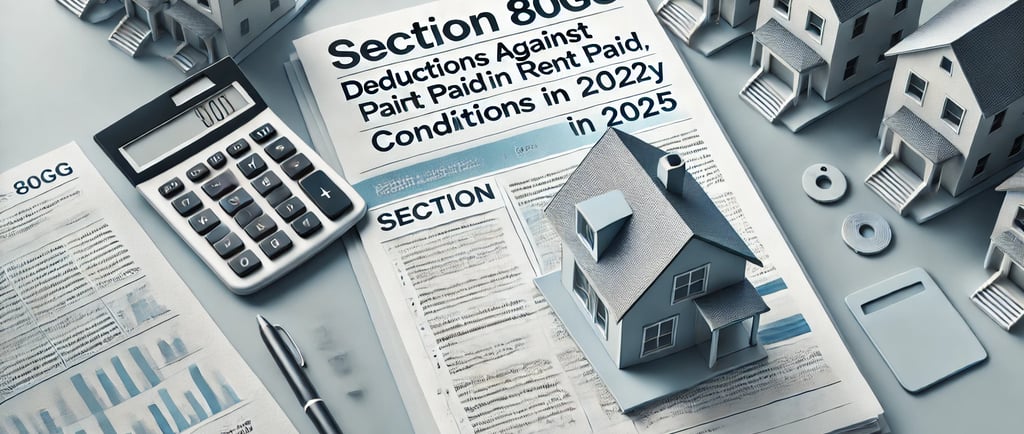Section 80GG: Deductions Against Rent Paid, Conditions, and Eligibility in 2025
Learn about Section 80GG in 2025—tax deductions for rent paid, eligibility criteria, conditions, and how to claim benefits without HRA.
Archita
2/10/20254 min read


In India, the cost of living, especially in metropolitan cities, has been rising steadily, with housing expenses being one of the most significant financial burdens for individuals. While salaried employees often receive House Rent Allowance (HRA) as part of their salary, which provides tax exemptions on rent paid, self-employed individuals and those without HRA benefits face challenges in managing their housing expenses.
To address this, the Income Tax Act of 1961 introduced Section 80GG, a provision that allows individuals to claim deductions on rent paid for residential accommodation. This article delves into the eligibility criteria, conditions, and calculations for claiming deductions under Section 80GG in 2025.
What is Section 80GG of the Income Tax Act?
Section 80GG is a provision under the Income Tax Act that allows individuals to claim deductions on the rent paid for their residential accommodation. This section particularly benefits self-employed individuals, freelancers, and salaried employees who do not receive HRA as part of their salary package. Unlike HRA, which is covered under Section 10(13A), Section 80GG is designed to provide tax relief to those who do not have access to HRA benefits.
The deduction under Section 80GG can be claimed for rent paid on furnished, semi-furnished, or unfurnished residential properties. However, certain conditions must be met to take advantage of this benefit.
Eligibility Criteria for Claiming Deductions Under Section 80GG
To claim deductions under Section 80GG, individuals must meet the following conditions:
No HRA or RFA Benefits: The individual must not receive any House Rent Allowance (HRA) or Rent-Free Accommodation (RFA) from their employer. If you are a salaried employee receiving HRA, you cannot claim deductions under Section 80GG.
No Ownership of Residential Property: The individual, their spouse, minor child, or the Hindu Undivided Family (HUF) of which they are a member should not own any residential property in the city or town where they are employed or carrying out their business. Additionally, they should not own any residential property anywhere in India.
Rent Payment for Residential Accommodation: The individual must pay rent for a residential property, which can be furnished, semi-furnished, or unfurnished.
Form 10BA Declaration: The individual must submit a Form 10BA declaration stating that they do not own any residential property and are paying rent for their accommodation.
Exceptions to Section 80GG
There are certain scenarios where individuals cannot claim deductions under Section 80GG, even if they meet the above criteria:
Ownership of Residential Property: If you own a house in the city where you are employed or carry out your business, you cannot claim deductions under this section.
Living with Parents or Relatives: If you are living with your parents or relatives and not paying rent, you cannot claim deductions under Section 80GG. However, if you pay rent to your parents or relatives, you can claim the deduction, provided they declare the rent as income in their tax returns.
Calculation of Deductions Under Section 80GG
The deduction under Section 80GG is calculated as the least of the following three amounts:
Rs. 5,000 per month or Rs. 60,000 per year.
25% of the adjusted total income for the financial year.
Total rent paid minus 10% of the adjusted total income.
Adjusted Total Income refers to the gross total income after deducting:
Long-term capital gains (LTCG).
Short-term capital gains under Section 111A.
Deductions under Sections 80C to 80U (excluding Section 80GG).
Example of Deduction Calculation
Let’s consider an example to understand the calculation better:
Adjusted Total Income: Rs. 6,00,000 per year.
Monthly Rent Paid: Rs. 15,000 (Rs. 1,80,000 annually).
The deduction will be the least of the following:
Rs. 60,000 per year.
25% of Rs. 6,00,000 = Rs. 1,50,000.
Rs. 1,80,000 (total rent) minus 10% of Rs. 6,00,000 (Rs. 60,000) = Rs. 1,20,000.
The least amount is Rs. 60,000, so the individual can claim a deduction of Rs. 60,000 under Section 80GG.
How to Claim Deduction Under Section 80GG?
To claim deductions under Section 80GG, follow these steps:
Maintain Rent Receipts: Ensure you have receipts for the rent paid during the financial year. The receipts should include details such as the landlord’s name, address, rent amount, and payment period.
Submit Form 10BA: File Form 10BA online through the Income Tax portal. This form declares that you do not own any residential property and are paying rent for your accommodation.
Provide Landlord’s PAN: If the annual rent exceeds Rs. 1,00,000, you must provide your landlord’s Permanent Account Number (PAN).
Include Details in ITR: When filing your income tax return (ITR), include the details of rent paid and the deduction claimed under Section 80GG.
Documents Required for Claiming Deduction Under Section 80GG
To claim deductions under Section 80GG, you will need the following documents:
Rent Receipts: Monthly rent receipts with details of the landlord and payment.
Rent Agreement: A copy of the rent agreement (optional but recommended).
Form 10BA: Declaration form submitted online.
Landlord’s PAN: Mandatory if the annual rent exceeds Rs. 1,00,000.
Bank Statements: Proof of rent payments through bank transfers or checks.
Conclusion
Section 80GG is a valuable provision for individuals who do not receive HRA but still bear the burden of high rental expenses. By understanding the eligibility criteria, conditions, and calculation methods, taxpayers can effectively reduce their taxable income and ease their financial burden.
However, it is essential to maintain proper documentation, such as rent receipts and Form 10BA, to ensure a smooth claim process. For further assistance, consult a tax expert or use online tax filing platforms to maximize your deductions under Section 80GG in 2025.
Frequently Asked Questions (FAQs)
1. Can I claim deductions under Section 80GG if I own a house in another city?
No, you cannot claim deductions under Section 80GG if you own a residential property anywhere in India.
2. Is Form 10BA mandatory for claiming deductions under Section 80GG?
Yes, Form 10BA is a mandatory declaration that must be submitted to claim deductions under this section.
3. Can I claim deductions if I pay rent to my parents?
Yes, you can claim deductions if you pay rent to your parents, provided they declare the rent as income in their tax returns.
4. What is the maximum deduction allowed under Section 80GG?
The maximum deduction allowed is Rs. 60,000 per year or Rs. 5,000 per month, whichever is lower.
5. Can salaried employees claim deductions under Section 80GG?
Salaried employees can claim deductions under Section 80GG if they do not receive HRA from their employer.
Housing India
Your source for housing insights in India.
© 2025. All rights reserved.
